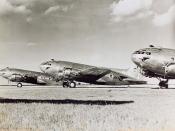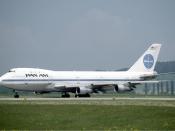Question 1.
What reasons did Boeing give for cancelling its development of the super jumbo? Why were these open to another interpretation?
The reasons for Boeing cancelling its development of their super-jumbo:
*Boeing carried out a study, which revealed that there was "insufficient customer demand"
*This study also stated that only 480 super jumbos would be sold over 20 years
*Therefore Boeing could not justify 7 billion US dollar investment
Boeing's reasons for cancelling the super jumbo project were open to other interpretation because:
*Boeing, possibly, did not have the production capabilities
*Boeing may have been pre-occupied with the acquisition of McDonnell-Douglas
*Boeing may be using this as a strategy to put off competitors, such as Airbus, from entering into this new market segment and, therefore, maintaining their dominance in all the current segments.
Question 2.
What strategic weaknesses did Airbus face in terms of its customer strategy?
Airbus' customer strategy weaknesses:
*Airbus cannot meet the customer's needs in all segments of the airline industry
*Airbus cannot, therefore, provide the customer with what they need; a range of aircrafts for all of their flying routes.
If the airlines (the customer) has a full family of aircraft from one manufacturer they benefit from:
1.Saving money in spare parts
2.Saving money on training staff
3.Lowered servicing costs
Question 3.
Is the Airbus strategy driven by customers? Or rather by a sense of rivalry with Boeing?
From the case study it would seem that Airbus' strategy is driven by both its customers, the airlines, and by their competitive rivalry with Boeing.
Evidence Airbus' strategy is customer driven:
*They tried to form an alliance with Boeing to provide the customer with a larger aircraft. This would suggest...


